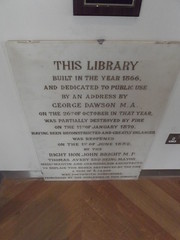John Bright MP
Commemorated on 3 plaques
On this site in the years 1844-1846 were situated the London offices of the Anti-Corn Law League, with which John Bright and Richard Cobden were so closely associated.
69 Fleet Street, EC4, London, United Kingdom where they worked (1843-1845)
Crispin Hall Named after the Patron Saint of Shoemakers, this building was opened by John Bright on October 12th, 1885 after William S. Clark decided to improve the cultural facilities for Clarks employees and other Streetonians. Previously there had been a small library at the factory in the charge of James Lovell the doorkeeper. Art classes and talk on sundry educational subjects were also held there in the reading room which was added later. A large public hall, lecture and reading rooms; a library and a museum were then provided here. The building now houses a number of small businesses and community activities. A display of photographs of Street dating back to the 19th century may be seen inside by the main stairway.
Crispin Hall, 81 High Street, Street, United Kingdom where they opened (1885)
This Library built in the year 1866, and dedicated to public use by an address by George Dawson M.A. on the 26th of October of that year, was partially destroyed by fire on the 11th of January 1879, having been reconstructed and greatly enlarged, was reopened on the 1st of June 1882, by the Right Hon John Bright M.P. Thomas Avery Esqs being Mayor. Messrs Martin and Chamberlain Architects to replace the books destroyed by the fire a sum of £14,000 was forthwith subscribed principally by the burgesses of this borough
Level 9, Library of Birmingham, Centenary Square, Birmingham, United Kingdom where they opened the second Birmingham Central Library (1882)




